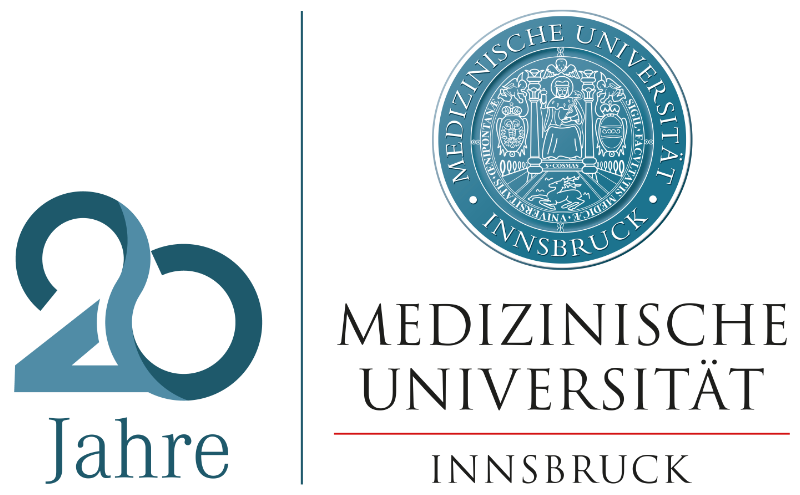Programme
des Doktoratsstudiums der klinisch-medizinischen Wissenschaften
(Programs for Clinical PhD doctorate study of clinical medical science)
Der Studienplan "Doktoratsstudium der klinisch-medizinischen Wissenschaften (Doctor of Philosophy / PhD)" wird ab 1. Oktober 2011 semesterweise eingeführt.
Folgende Programme wurden eingereicht, nach denen Interessierte an der Medizinischen Universität Innsbruck berufsbegleitend studieren können.
Applied Morphology and Regeneration (AMR) |
|
|
The program „Applied Morphology and Regeneration” offers a profound training in morphological and imaging techniques, including cell‐ and molecular biology as far as it applies to tissue morphology, regeneration and biomechanics. The focus of the program is on different human tissues and tissue models and interactions between various tissues and cell types, including normal and abnormal tissue development. The goal of the program is to train students to become physicians/scientists with knowledge and skills relevant to understanding morphology with a perspective on tissue engeneering. |
|
|
Univ.-Prof. Dr. Gerhard Pierer E-Mail: Gerhard.Pierer@i-med.ac.at Phone: +43 512 504 22731 |
Univ.-Prof. Dr. Marko Konschake Institut für Klinisch-Funktionelle Anatomie |
Clinical Cancer Research (CCR) |
|
|
The program “Clinical Cancer Research” has been composed in accordance with the already established program “Molecular Oncology”. The program “Clinical Cancer Research” is focused on the clinical and translational aspects of cancer research. It offers a basic training in ethics, methodology of clinical studies and gender aspects. Additionally, the knowledge on multiple aspects in the field of cancer research is presented like tumor angiogenesis, tumor immunology and molecular oncology. The goal of this program is to train students in current technologies that are relevant for advanced clinical cancer research and also to communicate the skills and knowledge to translate basic research into applied clinical research (clinical studies). This goal is pursued through courses that are directed by scientists in basic cancer research as well as by research oriented clinical oncologists. |
|
|
Programmkoordination Assoz. Prof. Priv.-Doz. Mag.Dr.rer.nat. Michael Außerlechner Programmkoordination Stellvertretung Assistenzprofessor Priv.-Doz. Dr.med.univ. Clemens Feistritzer
|
|
Clinical Neurosciences |
|
|
Das zukunftsorientierte Programm Clinical Neurosciences dient der interdisziplinären Ausbildung des wissenschaftlichen Nachwuchses zum selbständigen wissenschaftlichen Arbeiten auf dem Gebiet der Klinischen Neurowissenschaften. Die Ziele sind:
Programmkoordination Clinical Neurosciences Univ.-Prof. Dr.med.univ. Barbara Sperner-Unterweger E-Mail: Barbara.Sperner-Unterweger@i-med.ac.at Phone: +43 512 504 23629 Programmkoordination Stellvertretung Clinical Neurosciences Assistenzprofessorin Priv.-Doz. Dr.med. Katharina Hüfner E-Mail: Katharina.Huefner@i-med.ac.at Phone: +43 50 504 23701
|
|
Intensive Care and Emergency Medicine |
|
|
The PhD program "Intensive Care and Emergency Medicine" is directed to students interested in research focusing on topics of acute medicine. It is an interdisciplinary program representing different specialties including anesthesia, neurology, pediatrics, neonatology and internal medicine. |
|
|
Univ.-Prof. Dr. Michael Joannidis E-Mail: Michael.Joannidis@i-med.ac.at Phone: +43 512 504 24180 |
Univ.-Prof. Dr. Ursula Kiechl- Kohlendorfer E-Mail: Ursula.Kohlendorfer@i-med.ac.at Phone: +43 512 504 27307 |
Cardiovascular PhD |
|
|
Allgemeine Zielsetzungen des Programmes Das Clinical Ph.D. Programm „Cardiovascular Medicine“ stellt sich die Aufgabe, Ärztinnen und Ärzten in Ausbildung insbesondere zu einem Sonderfach der beteiligten Sektionen, Institute und Kliniken (Anästhesie / Intensivmedizin, Anatomie, Angiologie, Frauengesundheitszentrum, Gefäßchirurgie, Herzchirurgie, Humangenetik, Kardiologie, Labordiagnostik, Nephrologie, Neurologie, Pädiatrie, Pharmakologie, und Pulmologie), aber auch anderer an der Medizinischen Universität Innsbruck vertretenen Sonderfächer, die Möglichkeit zu geben die akademische Karriere an der Medizinischen Universität (Habilitation) als Fachärztin oder Facharzt fortzusetzen. Outcome (AbsolventInnen)
Erarbeitung eines kompetetiven wissenschaftlichen know-hows und Publikationen, sowie erfolgreiche Einwerbung von Drittmitteln um sich erfolgreich zum Beispiel für A2-Stellen an der Medizinischen Universität Innsbruck bewerben zu können.
|
|
|
Assoz. Prof. Priv.-Doz. Dr.med.univ. Nikolaos Bonaros Ao. Univ.Prof. Dr. med. Erich Brenner
|
|
Clinical Imaging Science |
|
|
This program is especially addressed to physicians who are planning to train for radiology or nuclear medicine. However, it is also open to physicians from other departments who are scientifically or clinically interested in imaging science. Besides the basic knowledge required for independent scientific work, recent knowledge of modern imaging methods in nuclear medicine and radiology will be taught, including molecular imaging. Comprehension of the technical backgrounds, the ability of independent and focused planning of a project, as well as the application of the available methods and their post-processing are parts of the three-year apprenticeship curriculum. Besides diagnostic applications of imaging methods, their implementation for the planning of minimal-invasive, interventional methods are taught.
After finalizing the program the graduate should feature the following skills: - Independent application of the different imaging and molecular methods such as magnetic resonance imaging (MRI), computed tomography, ultrasound, digital radiography / fluoroscopy, positron emission tomography or single photon emission computed tomography. The entire area of utilization, including that exceeding clinical practice, should be covered. In the case of MRI, this covers structural imaging, imaging of movements, i.e. the heart in a macroscopic or diffusion-weighted imaging at a microscopic level, as well as MR spectroscopy or functional MRI. - Independent utilization of the post-processing methods for the different modalities. - Knowledge of the imaging methods applicable for animal studies. - Substantiated knowledge about the existent intravasal contrast agents and tracers. |
|
|
Assoz. Prof. Priv.-Doz. Dr. med. Bernhard Glodny |
|
|
Ass. Prof. Priv.-Doz. Dr. med. Astrid E. Grams |
|




